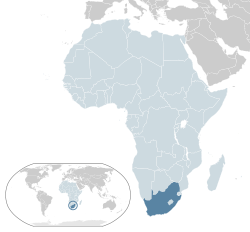|
South Africa
1973 Silver 1 Rand 32.7mm (15.00 grams) 0.800 Silver (0.3858 oz. ASW)
Reference: KM# 88, Hern# D286-9, 291-301, 305/6, 310/1 (1970-1990) | Engraver: Arthur L Sutherland, Jan van Zyl
SUID-AFRIKA · SOUTH AFRICA EX UNITATE VIRES A.L.S, South Africa coat of arms with the motto “Ex Unitate Vires” (Power Through Unity). Country name both in Afrikaans and English.
SOLI DEO GLORIA 1RAND J.v.Z, Springbok “Soli Deo gloria” is one of the five Reformers’ basic beliefs during the Protestant Reformation. It means “Glory to God alone”.
You are bidding on the exact item pictured, provided with a Certificate of Authenticity and Lifetime Guarantee of Authenticity.
  South Africaaaa, officially the Republic of South Africa, is the southernmost sovereign state in Africa etres of coastline of Southern South Atlantic and Indian Oceans , on the north by the neighbouring countries of Namibia , Botswana and Zimbabwe , and on the east and northeast by Mozambique and Swaziland , and surrounding the kingdom of Lesotho . South Africa is the 25th-largest country in the world by land area, and with close to 53 million people , is the world’s 24th-most populous nation . It is the southernmost country on the mainland of the Old World or the Eastern Hemisphere . It is the only country that borders both the Atlantic Ocean and the Indian Ocean . South Africaaaa, officially the Republic of South Africa, is the southernmost sovereign state in Africa etres of coastline of Southern South Atlantic and Indian Oceans , on the north by the neighbouring countries of Namibia , Botswana and Zimbabwe , and on the east and northeast by Mozambique and Swaziland , and surrounding the kingdom of Lesotho . South Africa is the 25th-largest country in the world by land area, and with close to 53 million people , is the world’s 24th-most populous nation . It is the southernmost country on the mainland of the Old World or the Eastern Hemisphere . It is the only country that borders both the Atlantic Ocean and the Indian Ocean .
South Africa is a multiethnic society encompassing a wide variety of cultures, languages, and religions. Its pluralistic makeup is reflected in the constitution ‘s recognition of 11 official languages, which is among the highest number of any country in the world. Two of these languages are of European origin: Afrikaans developed from Dutch and serves as the first language of most white and coloured South Africans; English reflects the legacy of British colonialism, and is commonly used in public and commercial life, though it is fourth-ranked as a spoken first language.
The country is one of the few in Africa never to have had a coup d’état , and regular elections have been held for almost a century. However, the vast majority of black South Africans were not enfranchised until 1994. During the 20th century, the black majority sought to recover its rights from the dominant white minority, with this struggle playing a large role in the country’s recent history and politics. The National Party imposed apartheid in 1948, institutionalizing previous racial segregation. After a long and sometimes violent struggle by the African National Congress and other anti-apartheid activists both inside and outside the country, discriminatory laws began to be repealed or abolished from 1990 onwards.
About 80 percent of South Africans are of Sub-Saharan African ancestry, divided among a variety of ethnic groups speaking different Bantu languages , nine of which have official status. The remaining population consists of Africa ‘s largest communities of European (white), Asian (Indian), and multiracial (coloured) ancestry. Since 1994, all ethnic and linguistic groups have had political representation in the country’s democracy , which comprises a parliamentary republic and nine provinces . South Africa is often referred to as the “Rainbow Nation” to describe the country’s newly developing multicultural diversity in the wake of segregationist apartheid ideology.
Until late 2015, the World Bank classified South Africa as an upper-middle-income economy. South Africa today is a developed country and a newly industrialized country . Its economy is the second-largest in Africa, and the 34th-largest in the world. In terms of purchasing power parity , South Africa has the seventh-highest per capita income in Africa. However, poverty and inequality remain widespread, with about a quarter of the population unemployed and living on less than US$1.25 a day. Nevertheless, South Africa has been identified as a middle power in international affairs, and maintains significant regional influence.
|












